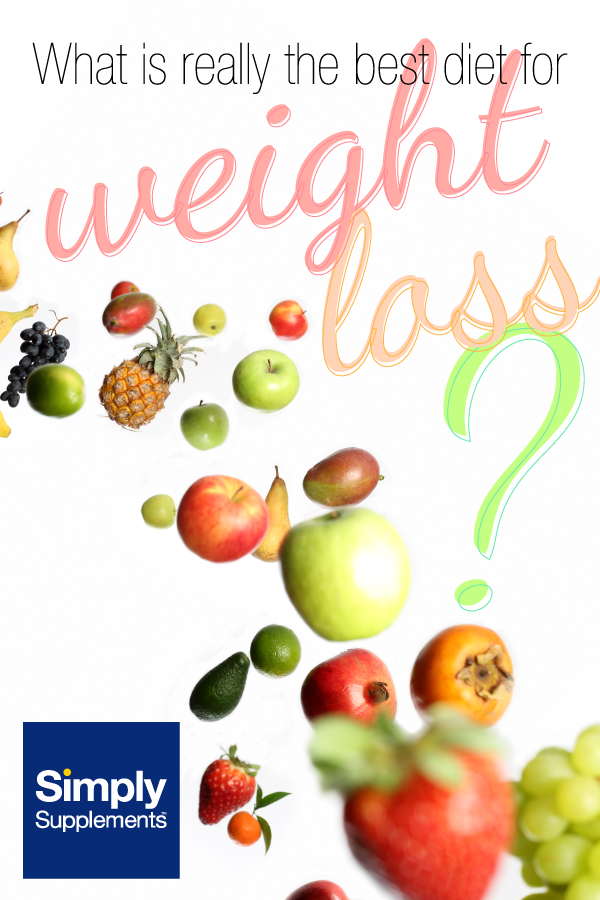What Is the Best Diet for Weight Loss?

Recently the UK has received the title of the “fat man of Europe”, given that a quarter of our population is now classed as obese, with over 60% of us being either overweight or obese. This statistic has trebled since 1980 and shows no signs of slowing down, with it being predicted that by 2050, half of us will be obese.
In theory, reversing the crisis and all the associated health complications should be straight-forward; just eat less and move more. However that mantra has failed, as the message is no match for the relentless obesogenic environment that we find ourselves in.
When looking at it, it is not hard to see why, as sedentary jobs and technological advancements decrease our need to be active. This, when combined by omnipresent availability of energy-dense, highly palatable foods which we can now get delivered to our door with the touch of a button, means the situation is very difficult to combat. These factors synergistically lead to the simple underlying cause of weight-gain: more calories going in than going out. When this happens over the long term, it causes obesity.
The alarming thing is that consuming only a small excess of calories over what the body requires can lead to substantial weight-gain in the long term. Many of us don't gain weight quickly, meaning obesity can creep up on us without us realising.
Given the amount of people who attempt a diet ever year, it shows that lack of will-power or desire is not the primary issue. Due to the strength of the environmental factors of obesity, it is important to know what we are doing when it comes to fat-loss. Unfortunately, this is a challenge given the conflicting information that is out there.
This issue is compounded by the fact that medical degrees rarely cover nutrition or exercise, meaning a lot of our General Practitioners are under-equipped to deal with the magnitude of the problem we are facing. Thanks to all the factors that are working against us, it is important to, preferably from a young age, have a critical understanding of how our diet, behaviour and lifestyle can affect our waistline and our health.
This present article aims to take a balanced and critical look at some of the most popular diets, summing up their strengths and weaknesses to give readers an idea of what sustainable behaviour changes are most effective to stay or become lean and healthy.
A Word on Fad Diets
I am sure we have all heard of the phrase ‘fad diets' and could name a few examples. I am equally sure that many of us have fallen victim of their attractive claims and promises. The problem with fad diets is that they provide initial success which is highly rewarding, but their nature means they are almost impossible to maintain long term.
Fad diets usually lead to initial success because their restrictive nature ensures a very low calorie intake that stimulates weight-loss. However, many people don't realise that weight-loss isn't just fat loss. Many fad diets can cause muscle and water loss, which means the scales go down temporarily but set you up for long term failure. This can negatively affect metabolic health and appetite responses, meaning that when you cannot manage the diet any longer, bodyweight and fat levels can often rebound to a higher level than before!
This demoralising reality can lead to the well-known yo-yo dieting which many people keep up for years, spinning their wheels instead of taking control of their health. A point many nutritionists like to stress is that most people didn't gain weight quickly, for many it could be a slow increase over years or decades, so why do people think it's possible to lose weight rapidly and keep it off?
What Can We Do About It?
As we have just discovered the flaws in fad diets, the next obvious question on many peoples mind is what is the best diet to lose weight? The simple answer is buried in the question. The word diet is derived from the Greek ‘diata' meaning ‘way of life'. So the best diet is one that fits your lifestyle and can see yourself sticking to and enjoying over the long term. This is by no means an attractive answer, but it's unfortunately true.
The most important thing that cannot be stressed enough is that successful weight-loss (and maintenance) is all about positive behavioural change and developing healthy habits that you can adhere without it negatively impacting your lifestyle.
In the next sections, we are going to explore some of the most popular diets which have some good research behind them. When doing this, we will weigh up their pros and cons which will hopefully provide some good suggestions and examples of positive behaviour changes that you could personalise to your lifestyle for sustained success.
Low Carbohydrate Diets
 Low carbohydrate diets are nothing new; they have been popular for decades, largely thanks to Robert Atkins and his ‘Atkins Diet'. However there are many other different types of low carbohydrate diets such as the Ketogenic (Keto) Diet, the Banting diet, Low-Carb, High Fat (LCHF), and The Blood Sugar Diet to name a few.
Low carbohydrate diets are nothing new; they have been popular for decades, largely thanks to Robert Atkins and his ‘Atkins Diet'. However there are many other different types of low carbohydrate diets such as the Ketogenic (Keto) Diet, the Banting diet, Low-Carb, High Fat (LCHF), and The Blood Sugar Diet to name a few.
Low carbohydrate diets used to be controversial due to the high intake of fat, but now they have gained acceptance and grown in popularity thanks to a plethora of research showing how effective they can be.
Even though certain well-known low carb diets have a few subtle differences, they all have one thing in common: they restricted carbohydrate intake. For the most part a low carbohydrate diet restricts the intake of foods such as sugary and fruit drinks, most alcohol, starchy foods such as bread, pasta, rice and potatoes, tropical fruits, low fat dairy and certain legumes.
On the contrary, these diets promote the intake of foods such as meats, fish (definitely oily fish), eggs, nuts, seeds, avocados, oils like olive oil, full fat dairy, vegetables, berries and dark chocolate.
The Theory Behind Low Carbohydrate Diets
It has been hypothesised that low carbohydrate diets hold a metabolic advantage over low fat diets because low fat diets gain most of their intake from carbohydrates. Carbohydrates stimulate insulin to the greatest degree and when insulin is high, fat burning cannot happen.
What Does the Research Say About Low Carbohydrate Diets?
Biochemistry shows us that when insulin is high, fat burning does indeed not occur. However, the body doesn't require insulin to store fat, so a high fat diet will lead to more fat burning, but will also lead to more fat storage. So when calories and protein intake are equated, there does not appear to be an advantage to weight-loss when compared to a ‘conventional' low fat diet.
That being said, there is an impressive amount of research showing that low carbohydrate diets hold an advantage over low fat diets when it comes to appetite responses. This means that many people find it easier to sustain a low calorie intake as they don't feel as hungry. Due to this, a lot of research studies have shown that low carb diets lead to a greater amount of weight-loss.
Furthermore, there is more and more evidence emerging that shows how effective low carb diets are for diabetic individuals. Although diabetics can certainly improve their condition on a more traditional low fat eating plan, research regularly shows that low carbohydrate diets are more effective for weight-loss, blood sugar control, improving cholesterol and decreasing the need for medication. In many cases, a well-planned low carbohydrate diet can actually reverse diabetes. A comprehensive overview of low carb diets for type 2 diabetics can be found here.
The research also suggests that unfortunately, many find that a very low carbohydrate diet (less than 50g per day) is hard to maintain over the long term. However, less than 130g per day seems manageable for most and still leads to impressive weight-loss and health benefits.
Now we have had an insight into low carbohydrate diets, let's evaluate their strengths and weaknesses.
Pros of Low Carbohydrate Diets
Low carbohydrate diets can be a great tool because:
- They are relatively simple to understand
- You don't have to count calories
- They can lead to impressive weight loss and health improvements
- They can curb appetite
- They often limit processed and ‘junk' foods
- They limit sugar, sugary drinks and alcohol
- They often lead to a higher protein intake which is beneficial to appetite and body composition
Cons of Low Carbohydrate Diets
Low carbohydrate diets have drawbacks because:
- They can be hard to adhere to for the long term
- They omit a wide range of healthy foods
- They require a lot of planning to ensure enough fibre, vitamins and minerals are consumed
- They can be expensive
- They can lead to side effects such as tiredness and irritability whilst the body is getting accustomed to the lack of carbohydrate
Paleolithic Diet
Also known as the paleo, primal or caveman diet, this diet takes things way back to what our hunter-gathering ancestors were believed to have eaten. This diet has grown in popularity in recent years due to the logical theory behind the diet.
On this diet, foods such as grass fed meats, fish and seafood, fresh fruit and vegetables, eggs, nuts, seeds and healthy oils such as olive, flaxseed and coconut are all allowed. Some paleo advocates recommend eating tubers too which include potatoes, sweet potatoes, yams and parsnips. However others don't.
There is also some disagreement with regards to whether certain grains like rice, and legumes such as peanuts can be eaten.
However all paleo dieters are in agreement that any processed and packaged foods, dairy, refined sugars, junk food, overly salty foods and refined vegetable oil are all off limits.
Theory Behind the Paleo Diet
As touched on previously, this diet makes sense theoretically. A Paleolithic way of eating only allows the ingestion of foods that our hunter-gathering ancestors had access to. So the highly calorie dense, processed foods that are partly to blame for the obesity crisis and associated diseases are obviously omitted.
Advocates believe that the human body has evolved on paleo foods and so these foods are going to be best for our health and bodyweight. Robb Wolf, a key name in the area of paleo dieting often uses this analogy: If the existence of mankind was represented on a 100 yard football pitch, 99.5 yards would represent the proportion of time we as a species were hunter-gatherers, with the last half a yard the time we have been eating dairy, sugary and processed foods.
What Does the Research Say About the Paleo Diet?
Unfortunately, a caveman style of eating doesn't stand up too well under scientific scrutiny. Firstly, the investigation of corpses from Paleolithic times has shown a high prevalence of plaque build-up in the arteries which is a key contributor to heart disease – not the best start. The paleo diet is also flawed as it implies that all hunter-gatherers ate the same foods. This is just not true. For example, the Kung tribe of southern Africa mainly lived off vegetarian foods such as nuts, seeds fruit and vegetables and had little meat. This is in stark contrast to the Inuit's who obtained around 90% of their energy from meat and fish which were high in fat.
Finally, the theory assumes that humans haven't evolved since hunter-gathering times. This is also not true. One example is that many humans have developed the lactase enzyme which can effectively digest the lactose in dairy. Furthermore, the human gut microbiota is so diverse and responsive to change.
This is likely why many cultures today thrive off vastly different eating patterns. Just compare the diet of the French to the Japanese for a good example! Despite the obvious flaws in the theory this diet can certainly stimulate improvements to body composition and health as shown in numerous research studies. This should come as no surprise as most of the foods on a paleo diet are nutrient dense and free from processing.
Let's conclude our evaluation by summing up the strengths and weaknesses of this diet:
Pros of the Paleo Diet
A paleo diet can have a positive impact because:
- It omits processed and junk foods
- It focuses on nutrient dense and fresh foods
- Calorie counting is rarely required
- Protein intake is often increased
- Omega 3 rich foods are regularly eaten
- It's often high in fibre
- It promotes regular exercise and physical activity and the reduction of sedentary behaviours
Cons of the Paleo Diet
A paleo diet has some notable limitations such as:
- The theory behind it is flawed
- The relative lack of scientific evidence into its efficacy
- It can be very expensive
- It can lead to deficiencies
- It omits a wide range of healthy foods
- Its restrictive nature
- Adherence
- Time spent in the kitchen
- It requires a lot of thought, planning and preparation
Intermittent Fasting Diets
Intermittent fasting diets, also known as time-restricted eating, are another example of dietary practices that have soared in popularity recently. Arguably the most well-known type of intermittent fasting diet is the 5:2 diet.
This eating plan is attractive to many as it only requires someone to ‘diet' for 2 days of the week. However these two days, at least initially, will be very challenging as they require you to only consume 25% of you daily energy requirements. So for a woman 500kcals per day is the limit, with men instructed to consume 600kcal. On these two days, it is recommended that you either consume your daily meal at lunch time, or have two small meals spread throughout the day.
Drinking water, black tea and black coffee are good tools to help people get through the long periods of calorie restriction.
Thankfully on the other 5 days of the week, you can eat what you like within reason. However, people are encouraged to be mindful of their eating and still focus on consuming wholegrains, lean meats, fish, fruit and vegetables with a small amount of alcohol allowed. This will ensure the hard work on the two days of calorie restriction is not undone.
Another form of intermittent fasting is daily time restricted eating. The ‘eating window' can vary, but most people fast for 16 hours of the day and eat only during the other 8 hours. Eating between 12 noon and 8pm seems the most popular.
The Theory Behind Intermittent Fasting Diets
The theory behind this diet is very straightforward. All of the different methods of intermittent fasting work by decreasing overall calorie intake which leads to weight-loss. On the 5:2, the 2 days of severe calorie restriction will still lead to overall weight-loss in the week when eating mindfully on the remaining 5 days.
In a similar vein, daily time restricted eating decreases calorie intake by limiting at what times you can eat. Usually, breakfast and morning/evening snacks are omitted which when paired with a sensible lunch and evening meal can lead to great results.
What Does the Research Say About Intermittent Fasting Diets?
Most people would think these diets are flawed because people would simply compensate for the intermittent calorie restriction by eating more during the off days or in the ‘eating window'. However on the whole that doesn't seem to be the case. With regards to the 5:2 diet, it has been found that people typically eat only 10% more calories the day following the energy restricted day, which when equalled out still leads to a caloric deficit. However, some people have been found to compensate by binge eating on highly energy dense fast food the following day which minimised the positive benefits.
Recent research has also shown that in young adults, skipping breakfast leads to the same hunger responses and calorie intake at a lunch time meal when compared to eating breakfast which will obviously have led to a greater calorie intake.
Many researchers are also excited by studies in animals that have shown fasting can lead to increased lifespan and various improvements in metabolic and cognitive health. Future studies on the benefits to humans will be published in the coming years.
With the current evidence we have, here are the pros and cons of intermittent fasting diets:
Pros of Intermittent Fasting Diets
- Very easy to understand
- Many find going a prolonged period without food manageable
- Can lead to a large deficit in calories to promote weight-loss
- Only have to ‘diet' at certain times
- Good evidence behind the diet
- Relatively flexible
Cons of Intermittent Fasting Diets
- Can be difficult to do for many people
- Can lead to lethargy, low blood sugar, irritability and dizziness
- Can lead to binge eating on the non-fasting days or in the eating window
Flexible Dieting
Flexible dieting, often known as ‘if it fits your macros' or IIFYM, is a strict but inclusive way to manage your diet. On this diet, you can eat whatever you like, as long as it fits into your daily calorie and macronutrient requirements.
Using the reference intake for the ‘average' woman as an example, flexible dieting indicates that you can consume whatever foods you like as long as it is equal to or in close proximity to 2000kcal per day, comprising 70g of fat, 260g of carbohydrate and 50g of protein. Hitting these targets daily will theoretically ensure that a healthy weight is maintained for the ‘average' woman.
Flexible dieting or IIFYM can be used for losing, maintaining or gaining weight, as your target macronutrients are set in line with your goals.
An easy way to obtain an estimate of your calorie requirement is by using an equation (like the Schofield or Cunningham) which will provide a ball-park figure for how many calories are needed a day to maintain your current weight.
For losing weight, between 400-1000 calories per day are usually subtracted. This type of diet requires that you carefully track all your food intake so you can objectively know your calorie and macronutrient intake on a day-to-day basis.
The Theory Behind Flexible Dieting
It is well-known that carbohydrates and protein provide 4kcal per gram, with fat providing 9kcal for every gram. So as long as you achieve your daily macronutrient target, your calorie intake will naturally fall in line with your goals. The theory states that it doesn't matter which foods provide your calories, as long as you hit your daily ‘macros'.
So, results would be the same if you obtained all of your daily carbohydrates from rice, or pasta or breakfast cereals. The same goes for protein and fats.
Flexible or IIFYM diets are best described as strict, but not restrictive; as they entail being strict with achieving daily macronutrient targets but not restrictive in terms of food choices.
What Does the Research Say About Flexible Dieting?
When done correctly, flexible dieting can be a great method of eating to provide a balanced and diet which is tailored specifically towards your goals. The research suggests one of the reasons why flexible approaches are effective is because they are found by many people to be sustainable and can mould into their lifestyle. As it can be stuck with long term it can lead to impressive and most importantly sustained results.
There are critics of flexible dieting that believe this way of eating prioritises macronutrient intake and calories whilst neglecting micronutrients (vitamins, minerals and polyphenolic compounds). However, this has been shown in research not to be the case. In fact, flexible dieters seem to have a greater intake of micronutrients because their diets include a wide range of food.
Obviously flexible dieting can be taken to extremes, by including plenty of non-healthy and processed foods to hit macronutrient targets, but this is not often the case. Most flexible dieters mostly eat healthy, nutrient dense foods, whilst leaving some of their daily calories for less healthy foods, promoting a good balance which helps people not feel deprived from the foods they like to eat.
Like all diets, flexible dieting or IIFYM has both strengths and limitations:
Pros of Flexible Dieting
- Very flexible in nature
- Many people find it easy to adhere to
- Mindful eating
- Vastly improves food knowledge
- Incorporates a wide range of foods
- Eating is tailored towards goals and energy needs
Cons of Flexible Dieting
- Is strict in terms of achieving daily calorie and macronutrient targets
- Requires all foods to be calorie counted
- Can lead to obsessing about food and calories
- Time consuming
- Does not limit processed foods
- Can sometimes promote quantity over food quality
Mediterranean Diet
 The Mediterranean diet is widely regarded by nutritionists and dieticians as one of the world's heathiest patterns of eating. However, it is more than a diet, it is a lifestyle. This style of eating is based off the diet of the Greeks, Spaniards and southern Italians who typically have impressive life expectancies, low levels of obesity and metabolic or cardiovascular diseases.
The Mediterranean diet is widely regarded by nutritionists and dieticians as one of the world's heathiest patterns of eating. However, it is more than a diet, it is a lifestyle. This style of eating is based off the diet of the Greeks, Spaniards and southern Italians who typically have impressive life expectancies, low levels of obesity and metabolic or cardiovascular diseases.
There are different variations of the Mediterranean diet, with some encouraging a regular intake of grains, cereals and other starchy carbohydrates, whereas others recommend limiting or totally omitting these. Because of this, and the different cultures that make up the Mediterranean, this type of diet can differ quite substantially.
However all Mediterranean style diets recommend consuming lots of locally sourced fresh fruits and vegetables, fish, wholegrains, nuts, seeds, eggs, cheese, olive oil and a moderate amount of wine!
Mediterranean diets also limit red meat, processed foods and for the most part replace saturated fat with unsaturated sources.
The Theory Behind Mediterranean Diets
The theory behind the diet is simple, as people who eat this type of diet and follow this lifestyle are healthy and have high life expectancy, so it must work.
It is also believed that Mediterranean people are also generally healthier and free from disease because they lead active lifestyles, manage stress levels, prioritise food in their culture and have strong social networks.
What Does the Research Say About Mediterranean Diets?
The research underpinning the diet is very strong, with there being scores of peer-reviewed scientific studies showing that a Mediterranean style diet is very effective for preventing a range of chronic diseases. There has also been a plethora of published studies that have looked at the effects of the Mediterranean diet in those with metabolic diseases.
A lot of studies are in agreement that a Mediterranean style diet is effective for managing or in some cases reversing diabetes, improving cholesterol levels, blood pressure and inflammation.
Research has also shown the diet can decrease all-cause mortality, and the risk of heart disease, dementia and developing a range of cancers.
Pros of the Mediterranean Diet
- Highly nutrient dense
- Easy to follow
- Underpinned by scientific evidence
- Inclusive
- Is a lifestyle not just a diet
- Is recommended by many national health services
- Easy to adhere to
- Promotes fresh and local produce
Cons of the Mediterranean Diet
- Can be expensive
- It is difficult to replicate the Mediterranean way of life
- Doesn't always lead to weight-loss as it can be calorie rich
What Do Most Diets of These Diets Have in Common?
Now we have analysed some of the more popular diets and evaluated their strengths and weaknesses it is clear to see some reoccurring themes that makes these diets health promoting. By regularly employing the factors that make these diets effective and attempting to avoid their weaknesses, it should set us up for the long term success that evades many dieters. For the most part, these diets are in agreement that:
• For weight-loss to occur there has to be a reduction in calories so that what you are eating provides fewer calories than what you are burning. This is called a calorie deficit or a negative energy balance.
• Protein intake from lean meats, fish, nuts, legumes and certain vegetables should be prioritised. Protein is not only beneficial to our health, but is especially important when trying to lose weight as protein helps us stay fuller for longer and preserves our muscle mass. Protein also requires a substantially greater amount of energy to digest than does carbohydrates or fats.
• Understanding portion sizes is important, as overeating on any diet will prevent weight loss and likely stimulate weight gain.
• Nutrient dense foods that are high in vitamins, minerals, phytonutrients and fibre should be a high priority.
• Foods which are processed, ‘junk', highly energy dense with added salt, sugar and fat should be limited.
• Alcohol should be consumed in low amounts.
What Can We Learn for These Diets?
Now we have looked at the reoccurring themes that everyone could benefit from and should try to incorporate into their lifestyles, let's have a look at ways we could implement some of the diets key strengths for the good of our health.
Even if we choose not to follow a low carbohydrate diet, there are certainly some points many of us could benefit from. Firstly, it should make us aware of the benefits seen from decreasing both our sugar intake and our portion sizes of carbohydrate-rich foods.
Low carbohydrate diets are also beneficial as they encourage the intake of foods such as oily fish, nuts, seeds and fibrous vegetables which have a plethora of associated health benefits. These diets also limit the intake of foods labelled ‘low fat'. Such foods have often been processed to remove their natural fat, replacing them with sugar and other additives which actually diminishes the nutritional quality.
Staying with the theme of processed foods, this is one of the key learning points we can apply from the Paleolithic diet. When looking at the countries which are deemed by nutrition experts to have the world's best dietary practices, such as Iceland, Italy, Greece and Japan, it is clear to see that their dietary components differ significantly. However, one thing they all have in common is that they eat very little processed foods.
Unfortunately, recent statistics have shown that we eat the highest amount of processed foods in Europe. Is it a coincidence that we are the most obese European nation, and eat the most processed food? People may also not wish to completely adhere to fasting styled diets.
Nevertheless, there are important messages that can be taken from their evaluation. Firstly, those who have performed fasting days or time restricted eating understand what it is to be truly hungry, and don't just eat mindlessly through boredom.
Similarly, appetite sensations can often be caused through dehydration and having a drink often can see the hunger pangs disappear. One way many of us could benefit from the principles of fasting in our everyday lives is by purposefully compensating for episodes of overeating. For example, if you are planning to go to a social event where you know you will be having a lot to eat and drink, you could have smaller meals during that day, and fast the following morning. By employing simple behaviours such as these, you are much less likely to gain weight from the socialising.
The main take home point from flexible dieting is how it can be such a powerful tool to spend a short amount of time weighing your food and tracking your calorie and macronutrient intake. By doing this, it gives an objective view on your overall diet and this information can be used to form positive changes.
Furthermore, flexible dieting teaches people about portion sizes and how to critical analyse nutrition labels, which can stimulate healthier food choices. Although weighing food and logging their calorie and macronutrient value can be time consuming and monotonous, it is surprising how quickly it improves food knowledge. Within a matter of weeks, a person can start to fairly accurately estimate the calorie and macronutrient composition of many common foods. For this reason, many nutritionists recommend that people track their food intake for a certain period of time.
There are numerous significant aspects that we can apply from a not only a Mediterranean style diet, but also the lifestyle to manage our weight and improve health. The big take-home message is to try and focus on food quality. This will ensure that the diet provides all the nutrients we need for optimal health. We can do this by again limiting processed foods but also, if possible, buying local and in-season produce.
Another key aspect of a typical Mediterranean lifestyle is that they take pride in not only preparing and cooking their meals but also eating them. Meal times are typically not rushed and are often spent socialising with friends and family, not eating mindlessly in front of the television. The Mediterranean lifestyle is also less sedentary and on the whole less stressful, which are aspects other than excess weight that can massively impact our health. Unfortunately here in the UK we will struggle to replicate their weather but nevertheless there are certainly aspects in our control that we can change for the better.
Summary
Unfortunately, we find ourselves in the middle of an obesity pandemic which is only getting worse. This phenomenon is caused by numerous physiological, psychological, social and environmental factors, but ultimately leads to a chronic energy imbalance which causes weight-gain.
The harsh reality is that many of us every year or even multiple times per year try to lose weight with a lot of us having success in the short term, but very few of us able to maintain this progress. This is simply because the changes we make when ‘dieting' are too drastic to maintain long term and probably don't fit too seamlessly into our lifestyle. So for many of us (not all), following X diet to the letter is not the best idea.
The long term solution is that generally speaking, we need to improve our nutritional knowledge, and make a number of small but positive behavioural changes that we could keep up long term, that don't make us feel deprived or unhappy.
Over time these small alterations will add up and ensure that we can still enjoy our food and our lifestyle whilst being a healthy weight and free of obesity-related complications.

Sources:
https://www.ncbi.nlm.nih.gov/pmc/articles/PMC3168743/
https://www.ncbi.nlm.nih.gov/pmc/articles/PMC2359752/
https://www.nature.com/articles/s41430-017-0019-4
https://www.ncbi.nlm.nih.gov/pubmed/17583796
https://www.ncbi.nlm.nih.gov/pubmed/29075849
https://www.ncbi.nlm.nih.gov/pubmed/29419624
https://www.ncbi.nlm.nih.gov/pmc/articles/PMC5772108/
https://academic.oup.com/jn/article/148/1/13/4823698#.WnAmrlGhEX8.twitter
https://www.ncbi.nlm.nih.gov/pubmed/29140151
https://www.ncbi.nlm.nih.gov/pubmed/29177567
https://www.ncbi.nlm.nih.gov/pubmed/28954418
https://www.ncbi.nlm.nih.gov/pubmed/29244059

 Nicole
Nicole 
























